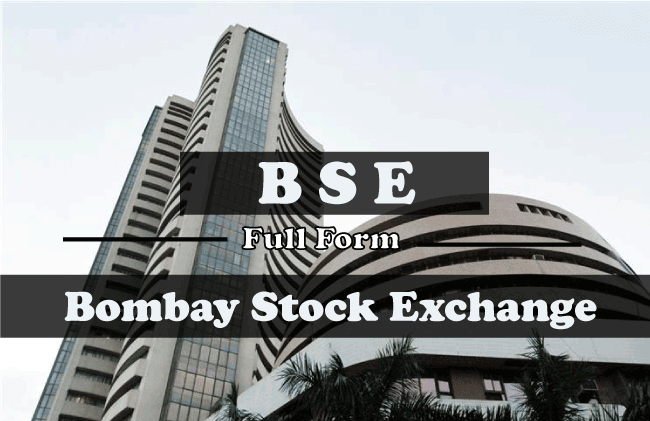What is the full form of BSE
BSE: Bombay Stock Exchange
BSE stands for Bombay Stock Exchange. One of India's first stock exchanges is the Bombay Stock Exchange (BSE). Its headquarters are in Mumbai, and it was founded in 1875. The Bombay Stock Exchange, or BSE, is India's oldest stock exchange. Its headquarters are in Mumbai, and it was founded in 1875. The BSE is a full-service market that provides its participants and members with various goods and services. Trading, clearing, settlement, and deposit-taking are some of them. In this post, we'll talk about the BSE in its entire detail and what that means for investors.

Overview of the Bombay Stock Exchange (BSE)
As the oldest stock market in Asia with a long history dating back to 1875, the Bombay Stock Exchange, or BSE for short, is well-known. It is currently the eleventh biggest stock exchange in the world by market capitalization. The S&P BSE Sensex index, whose headquarters are on Dalal Street in Mumbai, is the gold standard for measuring Indian equity markets.
Some Essential BSE Facts
- On July 22, 1875, the exchange's first transaction occurred.
- In 1986, the BSE S&P Sensex system was first introduced.
- The BSE is home to more than 5000 listed companies with a market value of even more than US$ two trillion, according to the Securities and Exchange Board of India (SEBI), which recognized the BSE as the country's first stock exchange in 1995.
- BSE has a significant global footprint, and top index providers, including MSCI, S&P Dow Jones Indexes, FTSE Russell, or Morningstar, track its indices.
Background of BSE
- The Native Share & Stock Brokers Association, founded in 1875 by a group of prominent businessmen from Mumbai, is the first known ancestor of the Bombay Stock Exchange. Later, this organization adopted the name Bombay Stock Exchange. On July 22, 1875, the exchange saw its first transaction.
- The BSE unveiled a brand-new mechanism in 1886 termed "the open outcry system." To buy and sell securities under this system, traders congregate in a setting like an auction. This was a significant improvement compared to the prior telephone-based trading system, which was prone to errors and delays.
- In 1995, the Securities and Exchange Board of India recognized BSE as the first stock exchange in India (SEBI). The independent overseer of India's securities markets is called SEBI. BSE changed from a membership-based organization to a public limited company in 2000. This made it possible for more people to participate in the exchange and assisted it in raising money for its expansion plans.
- The S&P BSE Sensex, a new equity index from BSE, was introduced in 2004. The S&P BSE Sensex is the gold standard for measuring Indian equities markets. It consists of 30 equities that represent diverse economic sectors.
- To create, offer, and license Dow Jones' international indexes in India, BSE and Dow Jones Indexes engaged in a strategic partnership in 2006. The S&P BSE Sensex was given a license by Dow Jones to be known as the "Dow Jones S&P BSE India 30 Index" as part of this agreement.
- The BSE debuted its "BSE On-Line Trading System" (also known as "BOLT") internet trading platform in 2007. This was a significant turning point in the exchange's history since it made deal execution quicker and simpler.
- In 2012, BSE launched the first mobile trading app in India under the name "BSE Mobile Trading App."
- In 2014, BSE unveiled "BSE Star MF," a cutting-edge new product that serves as an internet site for investing in mutual funds.
- BSE is currently one of the top stock exchanges in Asia and has a considerable international presence. More than 5000 publicly traded firms with a market value of more than US$2 trillion call it home. The BSE S&P Sensex index is frequently used as the gold standard for measuring Indian equities markets.
Conclusion
The Bombay Stock Exchange is known by its full name. One of India's earliest stock exchanges, it was founded in 1875. The location of the exchange is Mumbai, Maharashtra. Its market value is more than $500 billion, with more than 2500 enterprises listed. The BSE provides trading in currency, derivatives, debt, and equities. The 9th largest stock exchange in the world, measured by market capitalization.
|

 For Videos Join Our Youtube Channel: Join Now
For Videos Join Our Youtube Channel: Join Now










